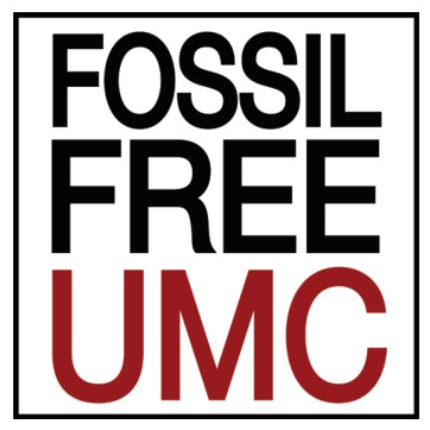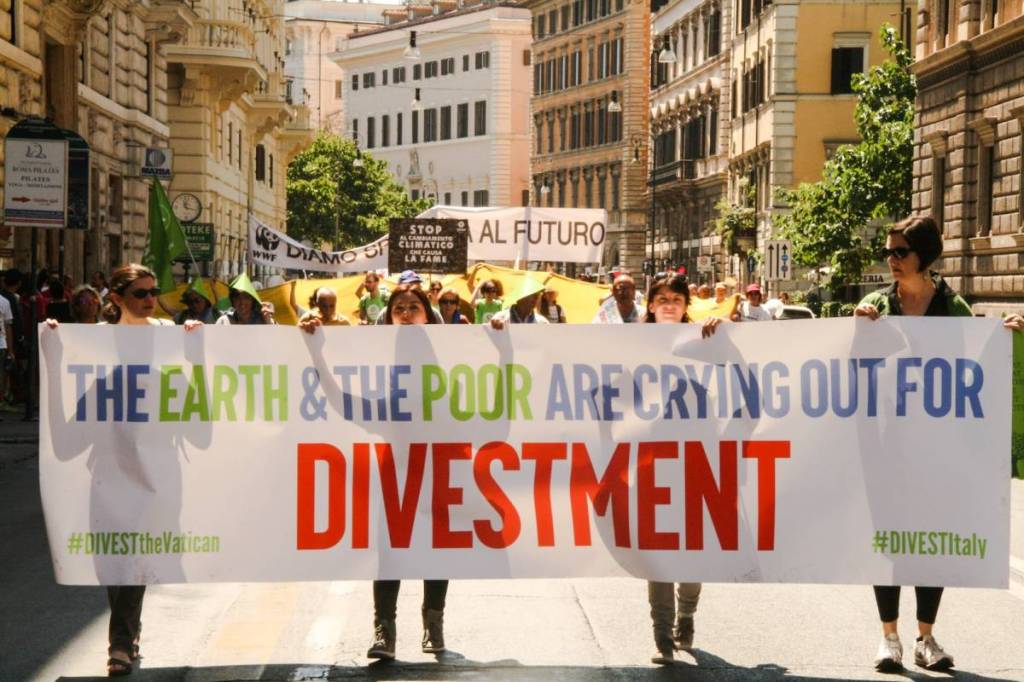Photo by Hoda Baraka/350.org, used with permission
To: Wespath’s staff, Board of Directors, staff, pensioners, and other investors:
In the debate about divestment from fossil fuels, the United Methodist Church is going through some serious soul-searching, and it is not easy. There is no reason to doubt that our fellow United Methodist pensioners, other investors, Wespath Board members, and Wespath staff love God, care about creation, seek to follow Jesus, and yearn for justice, even though we may think differently about divestment from fossil fuels. Nevertheless, at General Conference a vote will be taken, a decision will be made.
As a strong, well-respected United Methodist agency with 300 employees, Wespath is making its position on this issue known, though publications, webinars, and outreach to delegates. It favors engagement with fossil fuel companies rather than divestment.
We here at Fossil Free UMC, an all-volunteer organization, are also doing what we can to make our position known. The decades of disinformation, misinformation and outright lies of the fossil fuel industry to deceive the public and government continue even today, as do the millions they pay to politicians to block strong climate action. Because decades of engagement have not convinced fossil fuel companies to change these unethical practices or to transition to renewables, petition (20981-GA-¶717) calls on General Conference to add fossil fuels to our list of investment screens as a response to the grave harm caused by climate change.
This first in a series of open letters to Wespath is a response to its recent webinar on General Conference Legislation Q&A with Wespath Benefits and Investments, during which Wespath staff explained their strategy of corporate engagement with fossil fuel companies. Our response to this strategy is part of our effort to clarify and strengthen the case for our petition.
Jesus said, “Where your treasure is, there your heart will be also.” This text reminds us to value our spiritual treasures above our earthly treasures but can also remind us to invest our worldly treasures according to our values. The goal of Fossil Free UMC is to move the money invested by the United Methodist Church away from the causes of climate change and to invest in solutions.
Downplaying the Magnitude of the Climate Crisis
The following statement made early in the recent webinar downplayed the scope of the transition to renewables already taking place, the magnitude of the dangers of fossil fuels, and the urgency with which they need to be phased out: “80 percent of our current energy supply is met by fossil fuels. Science says we need to lower that amount dramatically over the next 30 years, but that fossil fuels will remain part of our economy for days to come.” I assume the speaker meant “for years to come.” But that is not what science says.
The “80 percent” figure in this statement ignores the transition already underway, driven by the phenomenal rise of clean energy technologies. Based on today’s policies alone, the share of fossil fuels in the global energy supply mix is on track to decline significantly by 2030, and it’s happening much faster where there are real investments.
Still, current policies are not enough. The above statement makes it sound like we have time–“30 years”– to dramatically reduce our use of fossil fuels. But science tells us that the only way to limit warming to the 1.5°C Paris climate target and avoid the worst impacts of climate change is to take strong and immediate steps to phase out fossil fuels NOW.
According to the Intergovernmental Panel on Climate Change, the deadly effects of climate change require immediate and rapid action to phase out fossil fuels along with the roll-out of renewable energy, improved energy efficiency, and increased electrification. The IPCC report shows how stock markets, and the associated industry of banks, insurers, lawyers and financial services providers (like Wespath) are profiting from activities that are at odds with their countries’ climate commitments and are putting investors and civilization itself at risk.
The International Energy Agency (IEA) and the UN have warned against new fossil fuel projects anywhere in the world if the world is to limit warming to 1.5°C. Scientific American says it like this: “That means no exploration, no new wells, mines, pipelines, refineries or power plants. We already have a massive amount of fossil fuel infrastructure, and it will take decades to phase out its use. It makes no sense to throw good money after bad and prolong the inevitable. The International Energy Agency has concluded that any new fossil fuel investments from now on would be incompatible with meeting internationally agreed-upon climate targets.” Yet through Wespath, The United Methodist Church has over $1 billion invested in 300 fossil fuels companies, among them the world’s biggest. We don’t like these numbers.
So, let’s not throw good money after bad and prolong the inevitable transition that is already underway. California has been running on 100% renewables for 30 of the last 38 days. The need is for capital, which is yet another reason for the United Methodist Church to divest from fossil fuels and invest in goods and services that lead toward a clean energy future. This means heeding the call from UN Secretary General Antonio Guterrez, who said,
“I call on all financial actors to abandon fossil fuel finance and invest in renewable energy. The only true path to energy security, stable power prices, prosperity and a livable planet lies in abandoning polluting fossil fuels, especially coal, and accelerating the renewables-based energy transition.”
As we approach General Conference, the struggle to move the United Methodist Church on this issue seems like a David and Goliath struggle, especially with Wespath on the opposing side. Wespath has a petition, 20982-GA (Par. 717) that calls on the United Methodist Church to engage with companies and other entities, “including advocating through active stewardship that companies (particularly the world’s largest greenhouse gas emitters) support and align with a just transition…” We oppose this legislation because it would institutionalize Wespath’s continuing corporate engagement with fossil fuel companies and cancel efforts to divest from fossil fuels.
We go into this General Conference debate confidently. Although Fossil Free UMC is a small team of volunteers, we enjoy wide support. We are part of a global grassroots network as evidenced by the signatories on our call to divestment and the rapid expansion of faith communities and other institutions divesting from fossil fuels. Our ranks are bristling. We have wide ground level support. We have the support of the youth who have left our denomination because they know what is at stake. We know that this is the ministry priority of our generation. The goal of Fossil Free UMC is to move the money invested by the United Methodist Church away from the causes of climate change so that we can invest wholeheartedly in the solutions.
For more on this topic find 10 reasons for Wespath to support fossil fuels divestment. You will find Fossil Free UMCs reasoned arguments on the following 10 points:
- We are called to faithful investing.
- Shareholder advocacy with fossil fuel companies is disproportionate to the magnitude of the climate crisis.
- Fossil fuel investments have underperformed; they pose a financial risk.
- The ‘Sustainable Economic Framework’ is not a ecologically sustainable.
- Wespath can turn the goal of Net Zero into reality through divestment.
- Later is too late! Wespath’s Transition-Ready Portfolio is not designed to lower emissions now.
- Other ethical investment screens have not harmed our UMC pension fund.
- Advocating for plugging methane leaks is commendable, but not enough.
- Engaging with fossil fuel corporations gives them a veneer of legitimacy.
- The first shall be last? So many churches have divested—why not the UMC?
The Reverend Sharon Delgado is on the Coordinating Committee of the United Methodist Creation Justice Movement and is the Convener of Fossil Free UMC. She is author of The Cross in the Midst of Creation, Love in a Time of Climate Change, and Shaking the Gates of Hell.


7 responses to “A Response to Wespath from Fossil Free UMC (Part 1)”
Very well done.
<
div>
Sent from my iPhone
<
div dir=”ltr”>
<
blockquote type=”cite”>
LikeLike
I agree with Fossil Free UMC. The crisis has been concealed, ignored and downplayed to the tipping point. It is high time people of faith stop fueling it. Wespath, you’re on the wrong path!
LikeLike
A great response to Wespath. It surprises me that they don’t disclose how little they invest in renewables compared to fossil fuels….nor do they disclose how mediocre their return on investments is on the investments in the petroleum industry.
Lois Knowlton
LikeLike
This statement could be strengthened: “Because decades of engagement have not convinced fossil fuel companies to transition to renewables, our petition (20981-GA-¶717) calls on General Conference to add fossil fuels to our list of investment screens as a response to the grave harm caused by climate change.” The decades of disinformation, misinformation and outright lies of the fossil fuel industry to deceive the public and government and the millions paid to politicians should be mentioned.
LikeLike
Thank you. You are right. It has been added.
LikeLike
Hard to imagine this is still a topic. Protect God’s gift of the earth and every living thing on it ring a bell?
LikeLiked by 1 person
It is actually unbelievable that an expected smart organization steeped in the faith could with a straight face support continued investment in fossil fuel. I agree with another responder. Wespath you are on the wrong path. Your path leads to continued suffering.
LikeLike